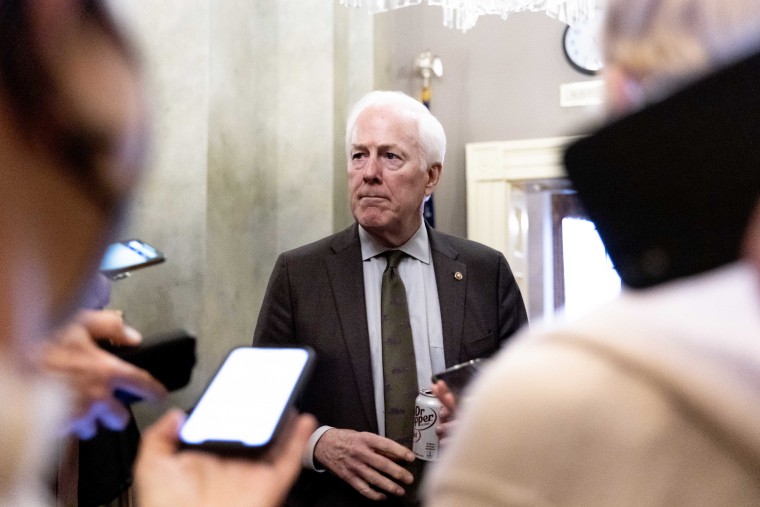On the second day of Judge Ketanji Brown Jackson’s confirmation hearings, Sen. John Cornyn focused much of his attention on Obergefell v. Hodges, the case that legalized gay marriage across the country. While the Texas Republican didn’t explicitly announce his opposition to marriage equality, the senator left little doubt that he believes the justices made a mistake.
Cornyn specifically shared his “concern” about the Supreme Court having created a “new right” that conflicts with those who hold “traditional” beliefs. And yesterday, as the confirmation process neared its end, the Texan returned to the subject:
“Over our nation’s history, there’s been something for everyone to love or hate [from the Supreme Court], from Plessy vs. Ferguson — which established the shameful ‘separate but equal doctrine’ for public schools ultimately overruled in Brown versus Board of Education — to Obergefell, which mandated same-sex marriages. When the Supreme Court creates a right that is not even mentioned in the Constitution, the independence and the legitimacy of the Supreme Court itself is called into question.”
Right off the bat, let’s just note for the record that the Obergefell ruling didn’t include any “mandates”: Adults can get married, but no one is required to do anything. What’s more, Cornyn suggested Plessy dealt with school segregation, when the ruling actually dealt with railroad cars, and ended up applying to segregated venues and facilities throughout American society. (Homer Plessy refused to sit in a Louisiana rail car for Black people. The case was not about schools.)
But even putting these errors aside, more important is the fact that a prominent Senate Republican put Obergefell and Plessy in the same category — reinforcing concerns that for some in the GOP, the fight over marriage equality isn’t quite finished.
Circling back to our recent coverage, when the Supreme Court cleared the way for marriage equality nationwide, there was an open secret in Republican circles: The GOP hoped to see a different judicial outcome, but once the matter was resolved, party insiders were relieved that the fight was over.
After all, the issue was a losing proposition for the Republican Party. Polls showed broad support for equal marriage rights, and this was one of the most prominent social/cultural issues in which Democrats had an obvious upper hand. Five justices helped advance civil rights in the United States, and in the process, they also did the GOP a favor by taking the debate off the table.
Or so it seemed at the time.
In the months that followed the Supreme Court’s Obergefell ruling in 2015, Sen. Marco Rubio was one of the most prominent Republicans who not only said he disagreed with the justices’ decision, the Floridian also vowed to look for ways to “change the law” in order to stop same-sex couples from getting married.
The GOP senator ended up with allies on the high court. In October 2020, Justices Samuel Alito and Clarence Thomas complained in a dissent about the “victims” of the court’s marriage equality ruling, and a month later, Alito delivered an unusually political speech to the Federalist Society in which he whined about social pressure surrounding anti-LGBTQ+ sentiments.
“You can’t say that marriage is a union between one man and one woman” anymore, the conservative justice whined, as if he were a candidate seeking social conservatives’ votes. “Until very recently, that’s what the vast majority of Americans thought. Now it’s considered bigotry.”
A year later, Kevin Roberts, the new president of the Heritage Foundation, argued that if you support marriage equality, “it means you’re not a movement conservative.”
To be sure, Cornyn hasn’t gone quite that far, at least not publicly, but his committee rhetoric suggested that in some conservative circles, the debate over marriage equality is ongoing.
Related:

